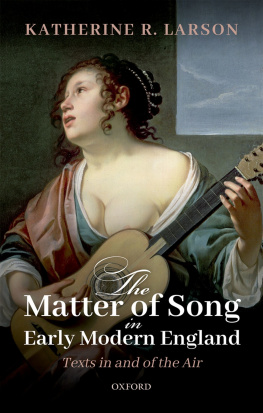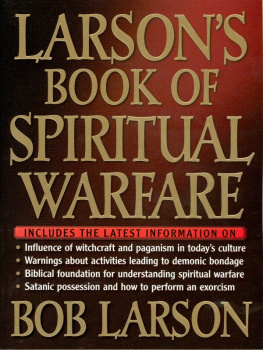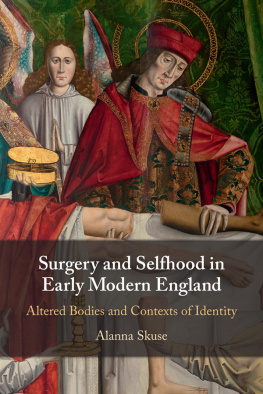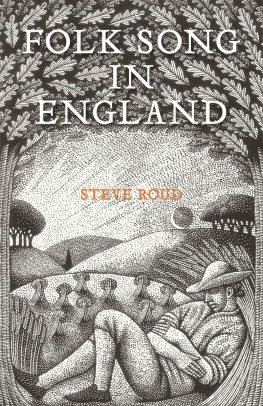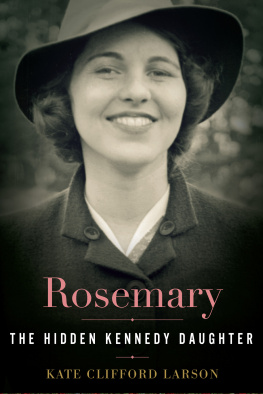Katherine R. Larson - The Matter of Song in Early Modern England: Texts in and of the Air
Here you can read online Katherine R. Larson - The Matter of Song in Early Modern England: Texts in and of the Air full text of the book (entire story) in english for free. Download pdf and epub, get meaning, cover and reviews about this ebook. year: 2019, publisher: OxfordUP, genre: Romance novel. Description of the work, (preface) as well as reviews are available. Best literature library LitArk.com created for fans of good reading and offers a wide selection of genres:
Romance novel
Science fiction
Adventure
Detective
Science
History
Home and family
Prose
Art
Politics
Computer
Non-fiction
Religion
Business
Children
Humor
Choose a favorite category and find really read worthwhile books. Enjoy immersion in the world of imagination, feel the emotions of the characters or learn something new for yourself, make an fascinating discovery.
- Book:The Matter of Song in Early Modern England: Texts in and of the Air
- Author:
- Publisher:OxfordUP
- Genre:
- Year:2019
- Rating:3 / 5
- Favourites:Add to favourites
- Your mark:
- 60
- 1
- 2
- 3
- 4
- 5
The Matter of Song in Early Modern England: Texts in and of the Air: summary, description and annotation
We offer to read an annotation, description, summary or preface (depends on what the author of the book "The Matter of Song in Early Modern England: Texts in and of the Air" wrote himself). If you haven't found the necessary information about the book — write in the comments, we will try to find it.
The Matter of Song in Early Modern England: Texts in and of the Air — read online for free the complete book (whole text) full work
Below is the text of the book, divided by pages. System saving the place of the last page read, allows you to conveniently read the book "The Matter of Song in Early Modern England: Texts in and of the Air" online for free, without having to search again every time where you left off. Put a bookmark, and you can go to the page where you finished reading at any time.
Font size:
Interval:
Bookmark:


Great Clarendon Street, Oxford, OX2 6DP, United Kingdom
Oxford University Press is a department of the University of Oxford. It furthers the Universitys objective of excellence in research, scholarship, and education by publishing worldwide. Oxford is a registered trade mark of Oxford University Press in the UK and in certain other countries
Katherine R. Larson 2019
The moral rights of the author have been asserted
First Edition published in 2019
Impression: 1
All rights reserved. No part of this publication may be reproduced, stored in a retrieval system, or transmitted, in any form or by any means, without the prior permission in writing of Oxford University Press, or as expressly permitted by law, by licence or under terms agreed with the appropriate reprographics rights organization. Enquiries concerning reproduction outside the scope of the above should be sent to the Rights Department, Oxford University Press, at the address above
You must not circulate this work in any other form and you must impose this same condition on any acquirer
Published in the United States of America by Oxford University Press
198 Madison Avenue, New York, NY 10016, United States of America
British Library Cataloguing in Publication Data
Data available
Library of Congress Control Number: 2019934015
ISBN 9780198843788
ebook ISBN 9780192581945
Printed and bound by CPI Group (UK) Ltd, Croydon, CR0 4YY
Links to third party websites are provided by Oxford in good faith and for information only. Oxford disclaims any responsibility for the materials contained in any third party website referenced in this work.
For Lyra
This is a book about solo song performance, but when I think about the individuals and institutions that have helped to bring The Matter of Song in Early Modern England to fruition, the metaphor of choral harmony seems much more apt.
My research was made possible by grants and fellowships from the Social Sciences and Humanities Research Council of Canada, the Connaught Foundation, the Renaissance Society of America, the Bodleian Library, and the Folger Shakespeare Library. The companion recording was produced thanks to a New Researcher Award from the Connaught Foundation. Funds from the Polanyi Prize for Literature also contributed to the project. A faculty research fellowship at the Jackman Humanities Institute provided me with invaluable thinking, writing, and singing time at a crucial point in the books gestation, as well as a remarkable intellectual and creative community within which to pursue that work. Thanks also to the University of Toronto Scarborough (UTSC) for research leave during which I was able to immerse myself in archives in Oxford, London, and Washington, DC.
The book has benefited from feedback from audiences at conferences large and small. I am especially grateful to the participants in the sessions on song and early modern musical practice that I co-organized with Leslie Dunn, Linda Austern, and Sarah Williams at the Shakespeare Association of America meetings in 2011, 2013, and 2018, and with Linda Austern, Jeanice Brooks, Kendra Leonard, and Amanda Eubanks Winkler at the Attending to Early Modern Women gatherings in 2009 and 2012. Several other conferences and workshops came at pivotal points for the project: Renaissance Poetic Form: New Directions at Wolfson College, Oxford (2012); Dramatizing Penshurst: Site, Script, Sidneys at Penshurst Place (2014); Performing Restoration Shakespeare at the Folger Shakespeare Library (2014); and Reception, Reputation, and Circulation in the Early Modern World at the National University of Ireland, Galway (2017).
The network of scholars who are working on aspects of early modern song and performance-based musical methodologies helped to shape The Matter of Song in Early Modern England in countless ways. Gavin Alexander, Linda Austern, Leslie Dunn, Scott Trudell, Sarah Williams, and Amanda Eubanks Winkler have been particularly important interlocutors for me. I have been similarly upheld and inspired by the vibrant community working on early modern womens writing and related questions of circulation and performance in literary studies. Thanks especially to Ilona Bell, Sheila Cavanagh, Marie-Louise Coolahan, Alison Findlay, James Fitzmaurice, Melinda Gough, the late Margaret Hannay, Natasha Korda, Mary Ellen Lamb, Rebecca Laroche, Clare McManus, Naomi Miller, David Norbrook, Elizabeth Scott-Baumann, Marta Straznicky, Mihoko Suzuki, Mary Trull, and Deanne Williams. A fortuitous encounter with Jennifer Richards in the Folgers reading rooms led to a rich and ongoing dialogue around aural transmission. Thanks also to Gary Tomlinson, whose feedback deepened my analysis of the musical breath, and to Ben Burton, Katherine Butler, Heather Dubrow, Tim Harrison, Elizabeth Leach, Scott Schofield, William Shullenberger, Deanna Smid, Tiffany Stern, Nora Williams, and Henry Woodhuysen for valuable input and resource suggestions.
I am fortunate to be a part of an exceptional intellectual community at the University of Toronto. Linda Hutcheon realized before I did that I was going to write a book about music and generously read and commented on the manuscript in its entirety; she has also modelled the very best kind of collaborative and interdisciplinary work, both as a scholar and as a mentor. Thanks as well to my early modern colleagues, especially David Galbraith, Elizabeth Harvey, Lynne Magnusson, Mary Nyquist, Paul Stevens, and Holger Syme, and to all of the faculty and staff at UTSC English.
The Matter of Song in Early Modern England has been equally enriched by conversations with my students. The members of my Sounding Spectacle in Early Modern England (2012) and Playing with Sound in Early Modern Performance Texts (2017) undergraduate seminars and the graduate students in Gender and Song in the Early Modern Context (2012) discussed chapter drafts as a part of their course reading; their insights are reflected in several places in the book. Three talented doctoral research assistants were also involved with this project. Jennifer McDermott and Adele Wilson undertook crucial tasks associated with early sections. Claire Duncan read every word of the finished draft and was meticulous in the final stages of proofreading and reference checking; the manuscript was improved in substance as well as formatting as a result of her work.
I owe a great deal to the musicians who contributed to this project. The remarkable artistry of lutenist Lucas Harris is apparent throughout the companion recording. It was a privilege to work on this repertoire with him. I also want to acknowledge our recording engineer Ron Searles, who produced and mastered the tracks, and soprano Carla Huhtanen, who served as our ears at the Glenn Gould Studio. Lutenist John Edwards and soprano Hallie Fishel collaborated and performed with me at several conferences. Lutenist Matthew Faulk responded warmly to an out-of-the-blue email asking whether he would be willing to accompany my singing during a talk in Oxford; we ended up performing and recording together there again a year later. Thanks also to the Exultate Chamber Singers, my choral community during the writing of this book.
It has been a pleasure to work with the staff at Oxford University Press. Eleanor Collins has been a brilliant editor from our earliest communications. I am deeply grateful as well to the two anonymous peer readers she selected, who responded to the varied disciplinary textures of the project with rigor and generous insight. This is a much better book because of their suggestions.
Font size:
Interval:
Bookmark:
Similar books «The Matter of Song in Early Modern England: Texts in and of the Air»
Look at similar books to The Matter of Song in Early Modern England: Texts in and of the Air. We have selected literature similar in name and meaning in the hope of providing readers with more options to find new, interesting, not yet read works.
Discussion, reviews of the book The Matter of Song in Early Modern England: Texts in and of the Air and just readers' own opinions. Leave your comments, write what you think about the work, its meaning or the main characters. Specify what exactly you liked and what you didn't like, and why you think so.

